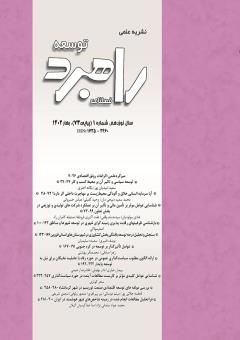بازشناسی ظرفیتهای رقابت¬پذیری زمینه¬گرای شهری در توسعه شهرها و مناطق
محورهای موضوعی :
1 - دانشیار شهرسازی، دانشگاه هنر اسلامی تبریز، تبریز، ایران
کلید واژه: واژه¬های کلیدی: رقابت¬پذیری شهری, هویت, زمینه¬های هویتی, پایداری اقتصادی, توسعه. ,
چکیده مقاله :
زمینه¬ها به مثابه عوامل و عناصر ارزشمند بومی می¬توانند جایگاهی پررنگ در بازتعریف رقابت-پذیری و توسعه شهری و منطقه¬ای دارا باشد. جستجوی زمینه¬های هویتی بویژه در ابعاد طبیعی، فرهنگی، اجتماعی و اقتصادی، مزیت¬های رقابتی پایداری را پیش¬روی رقابت¬پذیری می¬نهد که اتکاء بر آنها آینده¬ای مطلوب را نمایان می¬سازد. این پژوهش با هدف تبیین جایگاه زمینه¬های هویتی در رقابت¬پذیری شهری و چگونگی ایجاد مزیت¬های رقابتی زمینه¬گرا می¬باشد که با روش پژوهش تحلیلی و اسنادی با راهبردی زمینه¬مدار انجام شده است. مزیت¬های رقابتی زمینه¬گرا در زمینه¬های طبیعی، جغرافیایی، تاریخی، فضایی_کالبدی، مذهبی، فرهنگی، اجتماعی، اقتصادی، علمی و ورزشی قابل تعریف است. زمینه¬ها به عنوان مجموعه¬ای از عناصر ذاتی و جدایی¬ناپذیر پدیده¬ها، تجلی¬گر هویت آنهاست. زمینه¬های شهرها و مناطق، برخاسته از ابعاد سازنده مکانی، زمانی، فرهنگی، اجتماعی و سایر مولفه¬های وجودی است. این زمینه¬ها معرف هویت پویای شهرها و مناطق در گذر زمان و مکان و وجه تمایز آنها محسوب می¬شود. شناخت و تمرکز و تاکید بر زمینه¬های ارزشمند هویتی شهرها و مناطق در راستای توانمندسازی و پایداری می¬تواند به ارتقای رقابت¬پذیری آنها کمک نماید. به عبارت دیگر، زمینه¬ها محل رشد، ترقی و قدرت رقابتی شهرها و مناطق می¬باشند. مهمترین راهبردهای پیشنهادی عبارتند از: احترام به زمینه¬ها در توسعه شهری و منطقه¬ای، خلق مزیت¬های رقابتی معطوف به زمینه¬ها و برندسازی آنها، توسعه زیرساختهای گردشگری مذهبی؛ برندسازی و توسعه زیرساختهای گردشگری تاریخی، فرهنگی، اجتماعی، ورزشی، طبیعی و زیست محیطی.
Asghar molaei Abstract Contexts as valuable domestic elements and factors can have a high role in redefinition urban competitiveness. Studying in identical contexts, especially in the natural, cultural, social, and economic dimensions, will advance the sustainable competitive advantage, can be create the desirable economy future. The purpose of this research is to definition the role of identical contexts in urban competition and how to create competitive advantage in the context of an analytical and documentary research with an underlying strategy. Contextual competitive advantages can be defined in the natural, geographical, historical, physical, cultural, social, economic, and scientific and sports contexts. Contexts are a set of intrinsic and inseparable elements of phenomena, the emergence of their identity. The contexts of cities and regions are a constructive dimension of spatial, temporal, cultural, social, and other existing components. These areas represent the dynamic identity of cities and regions over time and space and are characterized by their differentiation. Identifying and focusing and emphasizing the value of identity of cities and regions in terms of capability and sustainability can help to improve their compatibility. In other words, the field of growth, progress and competitiveness of the power of cities and regions. The most important strategies presented are: development of religious tourism infrastructure; branding and development of historical, cultural, social, sporting, natural and environmental tourism infrastructure.
